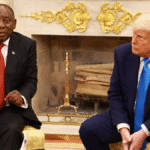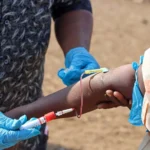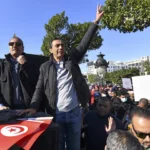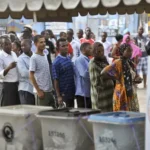AU force in Somalia gets UN nod to fight al-Shabaab
A new African Union force, AUSSOM, will replace ATMIS in Somalia as part of efforts to address Al-Shabaab threats, following UN Security Council approval.
AfCFTA: A new era of Intra-African trade
With 54 of the continent’s 55 nations signed on, it is poised to become the largest free trade area globally
Senegal closes all foreign military bases, flexes independence
Senegal has announced plans to close all foreign military bases in the country, focusing on ending the presence of French troops.
RSF adviser accuses General al-Burhan’s SAF of war crimes
Nahar detailed a litany of alleged crimes attributed to the SAF, including mass rapes in Darfur, forced disappearances of political dissidents, and the destruction of villages
Aliou Bah arrested for ‘insulting’ Guinea’s junta leader
The arrest of Guinean opposition leader Aliou Bah underscores the increasing crackdown on dissent by the military junta.
Kenyan rights groups decry surge in abductions of government critics
Among the missing are social media users who had shared AI-generated images of President William Ruto, which government supporters deemed offensive
69 migrants dead after boat capsizes off Morocco, including 25 Malians
The overcrowded vessel, carrying around 80 people, was en route from West Africa to Spain when it capsized
Cyclone Chido: Mayotte begins repatriations as aid needs grow
Days after Cyclone Chido hit Mayotte, transport links to the French overseas territory are gradually resuming, allowing some residents to be repatriated. Sea connections between Mayotte and the Comoros have reopened, enabling the return of around 500 undocumented Comorians. While commercial flights have yet to resume, French authorities have established an air route to Reunion Island for evacuations of French citizens. Since the cyclone struck, about 3,000 people have been evacuated from Mayotte, which is now facing shortages of essential supplies. Locals report widespread lack of water and electricity, with many living in makeshift shelters after their homes were destroyed by the storm. In response to the disaster, the European Commission is providing emergency aid to Mayotte and Mozambique. Several countries, including Belgium, Germany, and Italy, have also pledged shelter and essential supplies.
Gabon detains eight officers in soldier’s torture death
Eight Gabonese officers have been jailed on charges of torturing a soldier to death, with the authorities promising a full investigation amid public outrage.
Thousands flee violence in Mozambique to Malawi
Violence following Mozambique’s disputed presidential election has forced thousands of people to flee into neighboring Malawi for safety.
France hands over first base in Chad during withdrawal
France has handed over its first military base in Chad to the Chadian military, marking the beginning of its withdrawal from the country.
Kenya police deny involvement in abductions
The Kenyan police have denied involvement in the recent disappearances of several individuals who criticized the government, despite mounting evidence and accusations from human rights groups.
Mozambique prison break death toll hits 248
Unrest in Mozambique escalates with 248 fatalities as protests over disputed elections and a massive prison escape fuel violence across the nation.
2024: Deadliest year for Spain migration
A new report by Caminando Fronteras reveals that nearly 10,500 migrants died while attempting to reach Spain in 2024.
Civilians feared dead in Nigeria airstrikes on terrorists
At least 10 people killed in incident in northwestern Sokoto state, local sources say
The rise of Africa: Youngest continent hits 1.5 billion people
This demographic surge could transform Africa into a cornerstone of global progress
Mass prison escape in Mozambique amid election unrest
The unrest marks the most significant challenge to Frelimo’s authority in nearly five decades
U.N. exposes failures and corruption in Nigeria’s oil spill cleanup
In 2021, as a satellite passed over the Niger Delta, it captured images of vast swathes of barren land. The site, located outside Port Harcourt, was part of a cleanup project listed by the United Nations Environment Programme (UNEP), aimed at restoring the area to its former state as green farmland. This was supposed to reverse the damage caused by decades of oil spills, which had transformed the Delta into a symbol of environmental degradation. However, instead of being rejuvenated, the land had become a desolate “moonscape,” deemed unusable for agriculture, according to U.N. documents. It wasn’t an isolated failure. A series of newly uncovered investigations, emails, letters to Nigerian ministers, and meeting minutes reveal a pattern of mismanagement and poor execution. Senior U.N. officials described the Nigerian cleanup agency, the Hydrocarbon Pollution Remediation Project (HYPREP), as a “total failure.” The agency’s selection of cleanup contractors came under heavy criticism in a U.N. review, which found that many of the firms hired lacked relevant expertise. The cleanup effort was further marred by shoddy practices: soil samples were sent to laboratories that lacked the necessary equipment to conduct the required tests, and auditors were physically obstructed from verifying whether work had actually been completed. The cleanup companies were often linked to powerful Nigerian politicians, a former Nigerian environment minister told the AP. U.N. officials shared similar concerns, pointing to the cozy relationship between political elites and contractors, which contributed to the project’s failures. The situation was supposed to be different. The Niger Delta has experienced thousands of oil spills since oil production began in the 1950s. Studies and reports have shown that local communities often use contaminated water for drinking, washing, and cooking, exacerbating health and environmental problems. Despite a 2011 U.N. survey that highlighted the severity of the pollution, spills continue to occur regularly. In November 2023, for example, the Ogboinbiri community in Bayelsa State suffered its fourth spill in just three months, devastating fields, streams, and fisheries. “We haven’t harvested anything,” said farmer Timipre Bridget. “There’s no way to survive.” Following the 2011 survey, oil companies, including Shell—the country’s largest private oil and gas firm—agreed to contribute $1 billion toward cleaning up the worst-affected area, Ogoniland. The U.N. was relegated to an advisory role, while the Nigerian government took charge of managing the funds. But an internal investigation by U.N. scientists last year revealed that cleanup efforts outside Port Harcourt had been abysmal. The site was left without topsoil, with nearly seven times the petroleum contamination allowed by Nigerian health standards. The company responsible for the cleanup had its contract terminated, according to Nenibarini Zabbey, the current director of HYPREP. However, Philip Shekwolo, who was in charge when the contract was awarded, rejected the allegations. He dismissed the U.N. documents as “baseless” and “cheap blackmail,” insisting that the cleanup had been a success. Yet U.N. officials had raised concerns about the process as early as 2021, when Shekwolo was acting chief of HYPREP. A U.N. review in January 2022 found that 21 out of 41 contractors approved for cleanup work had no relevant experience. Some of these companies were simply construction firms or general merchants, according to meeting minutes. U.N. Senior Project Advisor Iyenemi Kakulu described the situation as effectively handing contractors a “blank check,” while Hyprep’s own communications chief, Joseph Kpobari, acknowledged that incompetent firms were responsible for the poor cleanups. Yet, these same firms were awarded contracts for more polluted sites, according to U.N. documents. Zabbey defended HYPREP’s record, claiming that 16 out of 20 sites in the first stage of the project had been certified as clean by Nigerian regulators. He also insisted that the agency followed proper procedures when issuing contracts. However, two anonymous sources familiar with the cleanup efforts told the AP that when officials visited laboratories used by HYPREP, they found that these labs lacked the necessary equipment to perform the required tests. In a letter to its customers, a U.K. laboratory that frequently worked with HYPREP admitted that many of its tests in 2022 were flawed and unreliable. The U.K. laboratory accreditation service even confirmed that the lab had been suspended twice during that period. Zabbey, however, claimed that HYPREP now closely monitors contractors, ensuring that laboratories adhere to Nigerian and U.N. standards and are regularly inspected. In 2021, the U.N. raised further alarms about HYPREP’s financial management, warning that the agency’s spending was not being tracked. Internal auditors faced strong resistance and were “demonized for doing their job,” according to the U.N.’s assessment. HYPREP’s previous leadership had actively obstructed audits, even physically preventing auditors from verifying whether work had been completed. Zabbey responded by claiming that the audit team is now valued, and financial accounts are audited annually. However, he only provided one audit cover letter, which acknowledged “weaknesses” in HYPREP’s financial management. One Nigerian politician, Sharon Ikeazor, attempted to bring about change. A lawyer by training, Ikeazor served as environment minister in 2019 and quickly recognized the depth of the problem. “The companies had no competence whatsoever,” she said in a phone interview. In February 2022, she received a letter from senior U.N. official Muralee Thummarukudy, warning of “significant opportunities for malpractice” in the contract awarding process. This was unusually strong language in U.N. diplomatic circles. Ikeazor removed Shekwolo from his position as acting HYPREP chief the following month, citing concerns that he was too closely tied to political interests. Shekwolo’s connections to politicians, many of whom owned cleanup companies, were well known, Ikeazor said. She explained that the few competent firms in the sector were excluded from major contracts, while the politically connected companies dominated. Shekwolo’s former employer, Shell, and the U.N. had both warned her about his involvement in the cleanup effort. Ikeazor’s decision to review and investigate the contracts sent “shockwaves” through Nigeria’s political class. She was quickly removed from office, with Shekwolo reinstated just two months later. Shekwolo denied any undue political influence in his work, insisting that his removal had no explanation and was merely a result of personal dislike from Ikeazor. In 2023, the U.N. officially ended its involvement in the Nigerian oil spill cleanup, citing the completion of its five-year consultancy agreement. However, Ikeazor and two other sources familiar with the project believe that the real reason for the U.N.’s exit was frustration over rampant corruption. Zabbey contended that the U.N.’s departure was simply a matter of the organization shifting its focus and moving on from the project.
First land deportation of Nigerien migrants from Libya in 12 years
This action reflects Libya’s efforts to address the issue of illegal immigration, which has become a significant challenge for the North African nation.
Turkey announces support to Sudanese people despite challenges
Turkey’s Ambassador to Khartoum has emphasized the strong historical ties between Turkey and Sudan and reaffirmed Ankara’s commitment to supporting the Sudanese people.
Messages of hope, unity from African leaders on Christmas day
African leaders, including those from Zambia, South Sudan, Namibia, Mozambique, and Malawi, delivered Christmas messages emphasizing peace, unity, and reconciliation.
DR Congo frees 14 of 17 Chinese illegal miners
While the government aims to improve the regulation of the mining sector, the decision to release most of the detainees has raised some eyebrows.
Mozambique post-election violence death toll hits 151
At least 21 dead, 20 injured since Monday when Mozambique’s top court confirmed ruling party’s candidate Daniel Chapo winner of presidential elections
Salt: Africa’s ancient gold
Salt, an essential mineral today, was once as valuable as gold in Africa, shaping trade networks
UN chief raises alarm over escalating food crisis in Sudan
‘The latest report by the IPC’s Famine Review Committee indicates that famine conditions are present in at least five locations in Sudan,’ says Antonio Guterres
Egypt, Jordan foreign ministers discuss Syria
Egyptian Foreign Minister Badr Abdelatty and his Jordanian counterpart Ayman Safadi stressed on Monday the importance of supporting Syria and respecting its sovereignty, unity, and territorial integrity. During a phone conversation, they highlighted the need for enhanced coordination between regional and international actors to support Syria’s reconstruction efforts, according to a statement from the Egyptian Foreign Ministry. They said this should be achieved through a comprehensive political process led and owned by the Syrians themselves, calling for ensuring the people’s participation and protecting their rights. The two ministers also reviewed the latest developments in Syria, with the Jordanian foreign minister briefing his Egyptian counterpart on the outcomes of his visit to Syria earlier in the day. Safadi held talks with Ahmad al-Shara, head of Syria’s de facto governing group, in Damascus on Monday, with discussions focusing on Syria’s political transition and broader regional security concerns. During the talk, Safadi condemned the recent Israeli incursion into the Syrian territory. In addition, Safadi reiterated Jordan’s commitment to aiding Syria’s reconstruction efforts, emphasizing that Jordan will encourage both regional and international partners to engage with Syria’s emerging leadership. A statement posted by Jordan’s Foreign Ministry on social media platform X further underscored Safadi’s remarks, stressing that Syria’s reconstruction is of strategic importance to both Jordan and the broader region. In the context of regional security, Safadi emphasized the significance of securing the 386-kilometer border shared by Jordan and Syria. He pointed to the ongoing challenges posed by terrorism, drug trafficking, and weapons smuggling along this frontier, stating that border should be stable and secure. Also on Monday, Abdelatty engaged in a phone conversation with his Saudi counterpart, Faisal bin Farhan Al Saud, to discuss the situation in Syria. Abdelatty emphasized the importance of respecting Syria’s sovereignty, unity, and territorial integrity, ensuring that its state institutions can effectively fulfill their roles. He underscored the necessity of implementing a comprehensive, Syrian-led political process that involves people from all walks of life to restore stability in the country. A militant alliance led by the Hayat Tahrir al-Sham group waged a major military operation from northern Syria on Nov. 27. It swept southwards, captured the capital Damascus, and overthrew former Syrian President Bashar al-Assad’s government within 12 days.
Haiti’s interim president condemns gang attack, two journalists killed
Haiti’s interim president, Leslie Voltaire, has condemned a deadly gang attack during the reopening of Port-au-Prince’s General Hospital on Christmas Eve, which left two journalists dead and several others wounded. Speaking on behalf of the transitional presidential council, Voltaire expressed outrage: “We condemn what happened today… when members of the population, journalists, and police officers were attacked,” he said. “We extend our condolences to the families, the Haitian National Police, and the journalists’ association. This act will not go unpunished.” The attack took place as reporters gathered to cover the hospital’s reopening, which had been delayed by gang violence earlier in the year. Suspected members of the Viv Ansanm gang coalition opened fire, causing panic and chaos. The Online Media Collective confirmed the deaths of journalists Markenzy Nathoux and Jimmy Jean. Graphic footage from the scene showed two bloodied bodies on stretchers, one wearing a press badge. Street gangs control around 85% of Port-au-Prince, paralyzing essential services. Despite government promises to restore order, violence continues to escalate, with journalists and law enforcement increasingly targeted. Haitian authorities have vowed to investigate the attack and hold the perpetrators accountable.
































